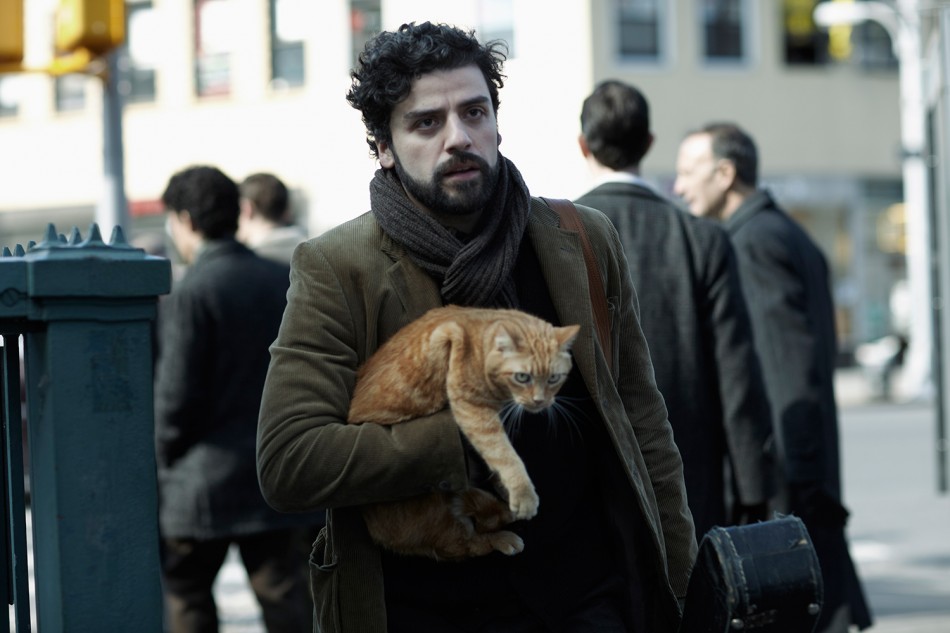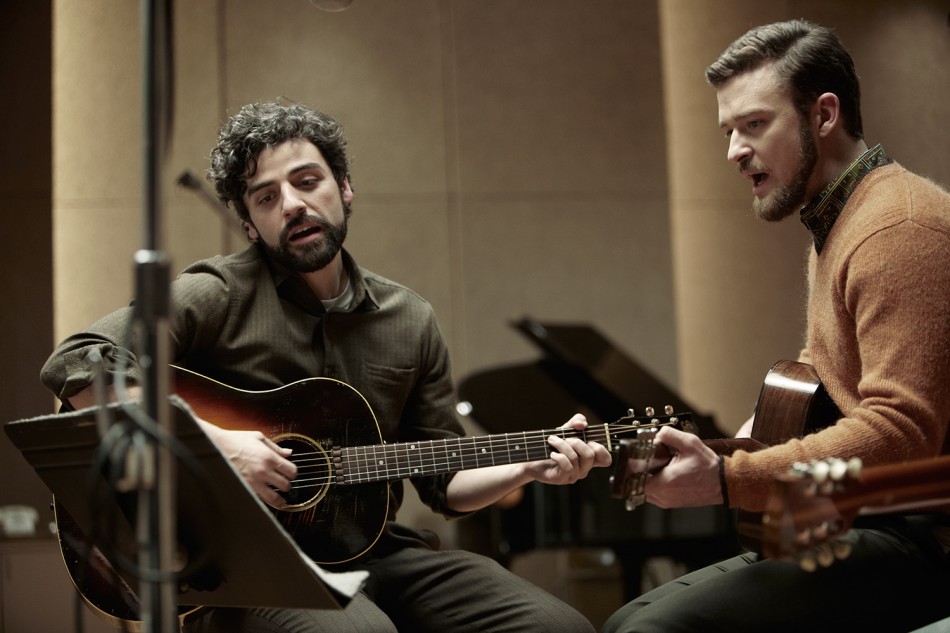
Oscar Isaac as Llewyn Davis in Inside Llewyn Davis. Photo: Alison Rosa
Saving Llewyn Davis – A Review
If ever a character needed the Coen brothers, it is Llewyn Davis (Oscar Isaac), a folk singer with a passable soulfulness, scrounging in 1961 at the Gaslight Café for his next good meal while Bob Dylan foretold haunts the club amid swirls of cigarette smoke. With his Welshman’s ancestral good looks, black beard, black eyes, and bohemian self-effacement, Davis doesn’t disappoint our first minutes of innocence – there is promise.
Yet it soon becomes clear that his first tune, “Hang Me, Oh Hang Me,” is a depressive’s allegory, and its pleading refrain, “I don’t mind the hangin’ but the layin’ in the grave so long” augurs Davis’s compulsion to twist himself at every turn. Tangled up in cinematographer Bruno Delbonnel’s moody blue, or ambling half-somnolent into green road-stop toilets or wintry streets, Davis pursues his misbegotten career with a clueless vagrancy. The second of his duo has jumped off a bridge. Llewyn’ll scavenge for record deals, a few dollars, another couch for the night, until rudely dismissed, he’s ready to ship out again with the merchant marines.
With a loser’s frayed doggedness that turns glum and self-destructive, Davis is in fact tedious and thus a problem for the film.
The directors can’t save Llewyn Davis but do, perhaps, salvage the film itself with a prodigious theatrical personality, fuzzy Ektachrome, quirky camera angles. They endlessly excoriate him through characters possessing a kind of supernatural wonder: a Brechtian elevator man; a smack addict jazzman played in cool sunglasses and, thanks to masterful John Goodman, a wide-angled physical helplessness. Not to mention the Disneyesque tabby named Ulysses. There is Jean Berkey (Carey Milligan), the iconic female folk singer with loose black bangs and a tight scarlet-ribbed turtleneck, portrayed with a fucked-over innocence as she harmonizes to Hedy West’s “500 Miles.” We may wince as she heaps insults on Davis in Washington Square for getting her pregnant — and his undisciplined penis that, “with double condoms, he should wrap in electrical tape.” It’s hard to disagree that he’s an “asshole.” And at the front and back of the film comes the punishing perennial Southern night messenger, laying in wait, armed with a fist.
Based loosely on Elijah Wald’s biography of folk blues artist Dave Van Ronk, The Mayor of MacDougal Street, the movie is hardly compelling as a period piece: too sedate for Monk or the kinetic tribalism of the beats. Inside Llewyn Davis stays more enthralled with its comic virtuosity and hallucinatory dare. For this Greenwich Village, photographed by the same cinematographer who received an Oscar nomination for Harry Potter and the Half-Blood Prince, is the Coen brothers’ school for the cinematic dark arts.
There is no shortage of tutors for the jejune Davis, but the most eminent is surely the embittered Roland Turner (Goodman), a fallen Falstaffian misanthrope with a mean horse addiction and a jazzman’s blunt disgust for “Jimmy Crack Corn.” Driving to Chicago with his Neal Cassady-ish companion, Johnny Five (Garrett Hedlund), Roland elucidates the dark metaphysics of a shitty life. Having “studied Santeria,” what “squares call the darks arts,” Roland warns Davis of his ability to deliver a sudden “a mysterious pain in his side,” making him wonder “why he can’t make anything come out right.” Davis’s “life,” Turner tells him, “is a big bowl of shit . . .” Goodman’s is a coo of malicious satisfaction. Lleywn Davis is indeed miles away from himself, his own magic so elusive and fugitive it’s turned to black.
Yet everyone else is close to somebody or something.

Oscar Isaac and Justin Timberlake in Inside Llewyn Davis. Photo: Alison Rosa
Davis’s onetime lover Jean has paired with Jim Berkey (Justin Timberlake), whose novelty chart buster, “Please Mr. Kennedy . . . Don’t You Shoot Me Into Outer Space,” offers a hilarious rerun to folk-singing’s top 40 seconds. Troy Nelson (Stark Sands), an army private possessed of impeccable diction, has his honeyed tenor and new professional management with Budd Grossman (F. Murray Abraham). And Grossman, august owner of The Gate of Horn, a 100-seat folk nightclub on Chicago’s Dearborn Street, well, he has just about anyone who’s anybody.
Perhaps Davis lost himself to the hard silence of his father, to whom he sings near the end of the film. Dementia sculpts the old man’s profile into a weathered metallic prow. Or maybe Davis never had the magic. Or maybe the magic even then was a commercial thing, as when, after hearing Davis sing, a blasé Grossman delivers a verdict of dry economy: “I don’t see a lot of money here.”
Were Llewyn Davis gifted with Van Ronk’s rawness, wine and old gravel in the throat, he might never have lost us. But as it is he is orphaned from inside to out, an exhausted fiction. And so when a young Bob Dylan appears in the background during the closing minutes of the film, singing “Farewell,” it’s a still legendary appearance. Seating him in profile with a ’49 Marin, the Hohner Marine Band harmonica suspended from its neck rack, the Coen brothers halo him from behind. From Davis’s seat near the bar, glimpsed through hipsters at a jumble of tables, we see Dylan as a cameo of himself, the rough pendant of changing times.
